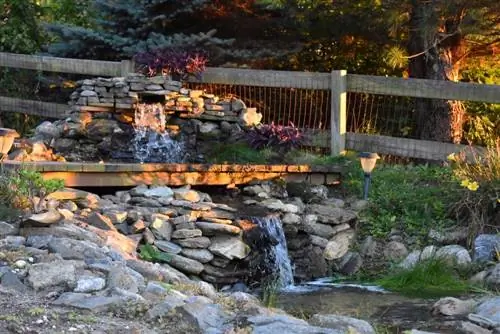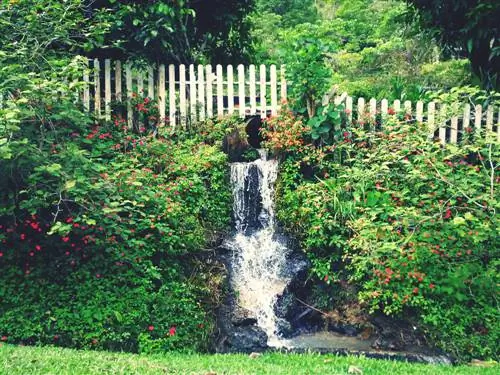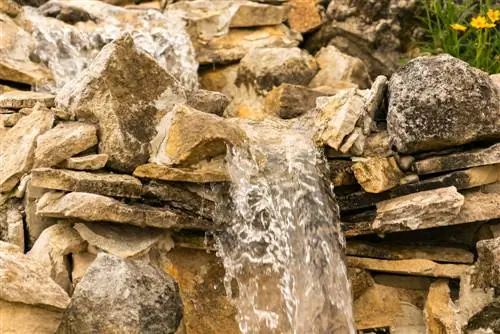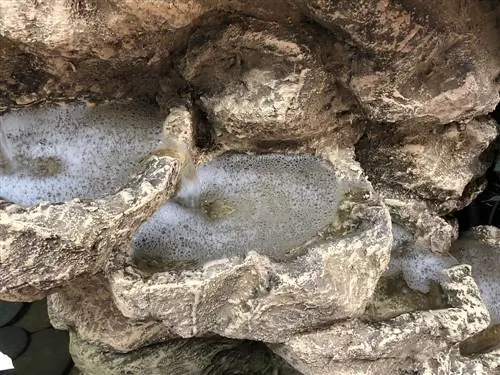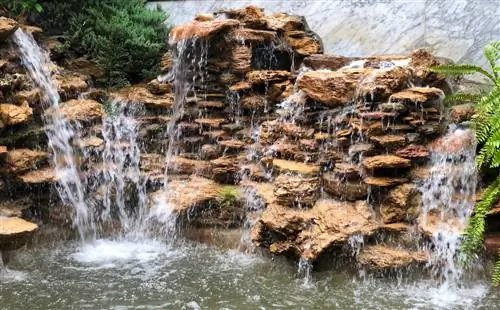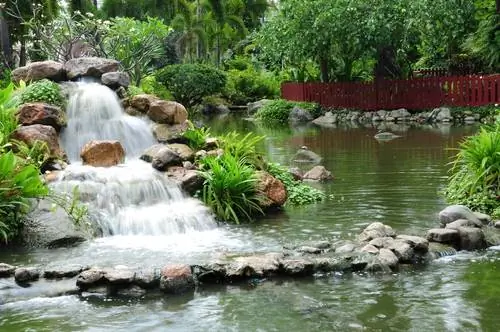- Author admin leonars@hobbygardeners.com.
- Public 2023-12-16 16:46.
- Last modified 2025-01-23 11:21.
Stream and small waterfall, flowing water creates a uniquely beautiful ambience at the ornamental pond, which ensures many hours of relaxation. Designed as a stepped cascade or bubbling calyx, ready-made elements can be used for the water features or your own inspiration can be realized.
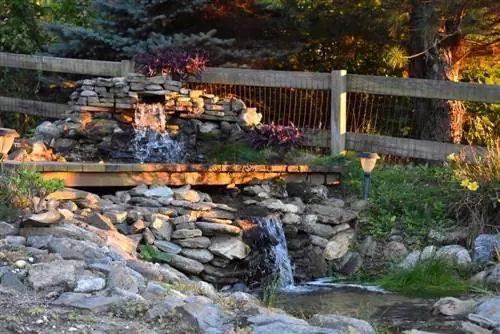
How to design a waterfall for your garden pond?
A waterfall for the garden pond can ensure improved oxygen supply and a better biological balance. For the design you need a storage container, a suitable feed pump and possibly prefabricated elements. Make sure the lines are close to nature and the flow speed is low.
Regardless of the undisputed statement that a waterfall in the garden pond is one of the most beautiful design elements that visually enhances the oasis of peace, the rippling water brings another very practical advantage. With the bubbling water, the oxygen supply and its quality improves significantly and even the smallest stream ensures a better biological balance in the pond.
Size and effort
While the financial outlay for the self-built waterfall on the garden pond will not cost huge sums, preparing the watercourse and making it as natural as possible is a little more complex in terms of time. Even if the size of the garden plot and the size of the pond dictates this, if possible, plan your waterfall at the pool in such a way that disturbing noise for the fish population and to neighboring properties is kept to a minimum. Several small, not too steep slopes are more work-intensive, but look particularly attractive when the lines are close to nature.
Location for the self-built waterfall
The commercially available stream bowls can be used as storage containers for the water flowing down the valley. Such tanks are usually made of robust plastic and are already equipped with the necessary inlets and outlets and sometimes even with pumps and the associated water filters. The size of the storage container you need depends (among other things!) on how far the pipe route will be into the pond and whether your waterfall should be in continuous operation or only flow for a limited time. Depending on the delivery height and depending on HOW, i.e. in what form the cool water is supposed to trickle along, the system needs a certain and not insignificant water supply, which our table shows in liters:
| Head (cm) | 30 | 50 | 60 | 100 / 125 | 150 / 200 | 250 |
|---|---|---|---|---|---|---|
| Foam nozzle | 2,500 | 3,500 | 4,500 | |||
| Water Bell | 900 | 1,800 | 2,700 | 3,500 / | ||
| Cupe | 1,200 | 2,200 | ||||
| Tulip | 700 | 900 | 1,100 | |||
| Pirouette | / 2,500 | 2,800 / | ||||
| Fountain | 600 | 900 | 1,200 | / 2,200 | 2,800 / 4,000 | 4,500 |
| Calyx | 600 | 900 | 1,200 / | 2,800 / |
Source: “Teich compact” 3rd edition from 2014 with kind permission from Eugen Ulmer Verlag Stuttgart
The optimal pump size
In addition to the size (length, width and depth) of the stream and its terrain-dependent route, the volume of the stream bowl and the required design and performance of the feed pump must also be taken into account when planning the waterfall. If the installation of cascades for the water supply is then desired, a considerable amount of water is produced relatively quickly, which requires maximum performance from the pump. Even with a low delivery height of 200 cm, it must be expected that the pump delivery capacity can be between 700 and 2,000 liters per hour; at 330 cm the value is even 4,500 liters.
Tip
It is not uncommon for the flow speed in the stream to suddenly be too high, especially after very ambitious waterfall projects. One or more large stones help reduce and even cause turbulence in the water, which in turn helps to enrich the pond water with additional oxygen.

